汉英翻译技巧之词类转换法_Conversion
- 格式:doc
- 大小:49.00 KB
- 文档页数:4
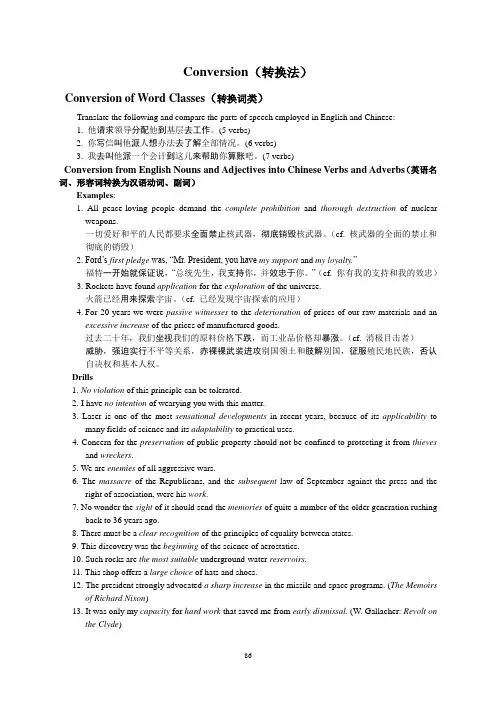
Conversion(转换法)Conversion of Word Classes(转换词类)Translate the following and compare the parts of speech employed in English and Chinese:1. 他请求领导分配他到基层去工作。
(5 verbs)2. 你写信叫他派人想办法去了解全部情况。
(6 verbs)3. 我去叫他派一个会计到这儿来帮助你算账吧。
(7 verbs)Conversion from English Nouns and Adjectives into Chinese Verbs and Adverbs(英语名词、形容词转换为汉语动词、副词)Examples:1. All peace-loving people demand the complete prohibition and thorough destruction of nuclearweapons.一切爱好和平的人民都要求全面禁止核武器,彻底销毁核武器。
(cf. 核武器的全面的禁止和彻底的销毁)2. Ford’s first pledge was, “Mr. President, you have my support and my loyalty.”福特一开始就保证说,“总统先生,我支持你,并效忠于你。
”(cf. 你有我的支持和我的效忠)3. Rockets have found application for the exploration of the universe.火箭已经用来探索宇宙。
(cf. 已经发现宇宙探索的应用)4.For 20 years we were passive witnesses to the deterioration of prices of our raw materials and anexcessive increase of the prices of manufactured goods.过去二十年,我们坐视我们的原料价格下跌,而工业品价格却暴涨。
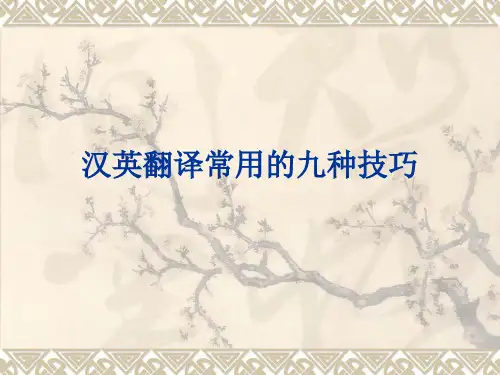
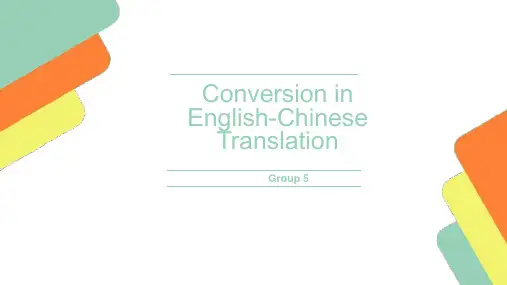
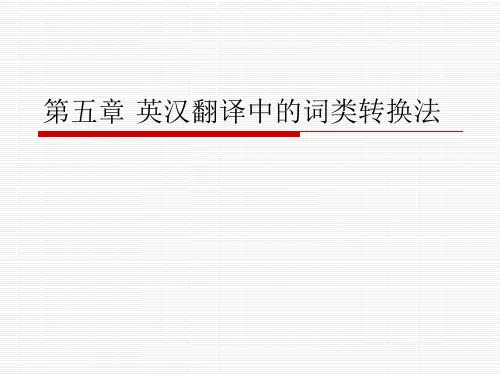
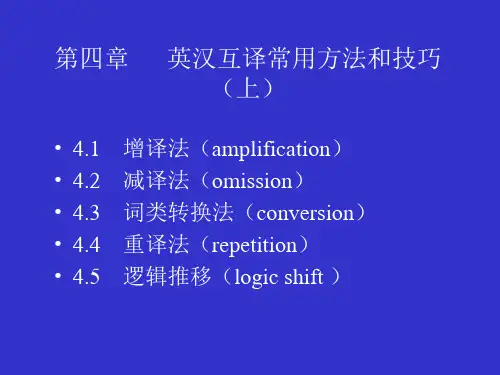
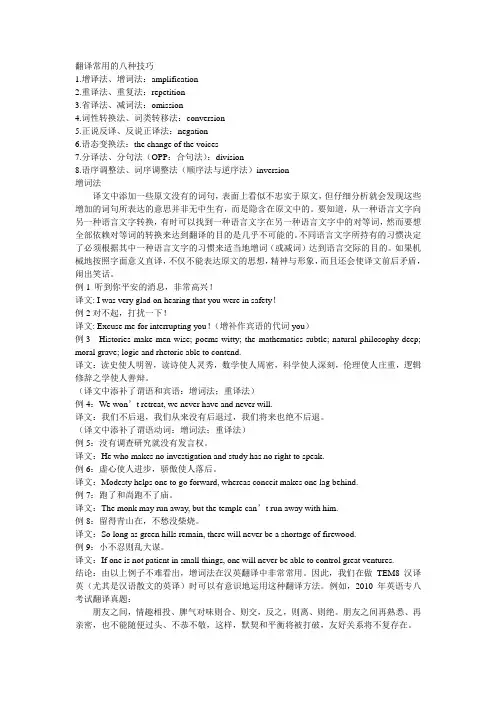
翻译常用的八种技巧1.增译法、增词法:amplification2.重译法、重复法:repetition3.省译法、减词法:omission4.词性转换法、词类转移法:conversion5.正说反译、反说正译法:negation6.语态变换法:the change of the voices7.分译法、分句法(OPP:合句法):division8.语序调整法、词序调整法(顺序法与逆序法)inversion增词法译文中添加一些原文没有的词句,表面上看似不忠实于原文,但仔细分析就会发现这些增加的词句所表达的意思并非无中生有,而是隐含在原文中的。
要知道,从一种语言文字向另一种语言文字转换,有时可以找到一种语言文字在另一种语言文字中的对等词,然而要想全部依赖对等词的转换来达到翻译的目的是几乎不可能的。
不同语言文字所持有的习惯决定了必须根据其中一种语言文字的习惯来适当地增词(或减词)达到语言交际的目的。
如果机械地按照字面意义直译,不仅不能表达原文的思想,精神与形象,而且还会使译文前后矛盾,闹出笑话。
例1 听到你平安的消息,非常高兴!译文: I was very glad on hearing that you were in safety!例2对不起,打扰一下!译文: Excuse me for interrupting you!(增补作宾语的代词you)例3 Histories make men wise; poems witty; the mathematics subtle; natural philosophy deep; moral grave; logic and rhetoric able to contend.译文:读史使人明智,读诗使人灵秀,数学使人周密,科学使人深刻,伦理使人庄重,逻辑修辞之学使人善辩。
(译文中添补了谓语和宾语:增词法;重译法)例4:We won’t retreat, we never have and never will.译文:我们不后退,我们从来没有后退过,我们将来也绝不后退。
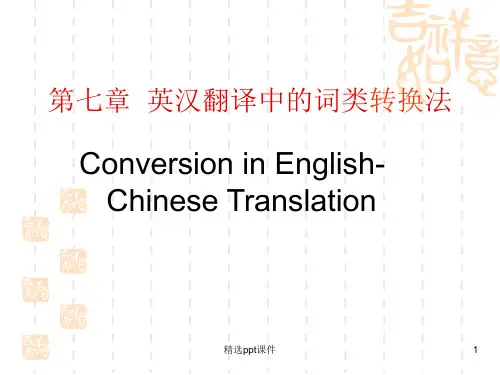
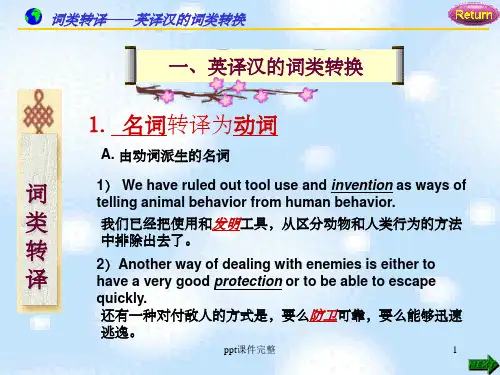

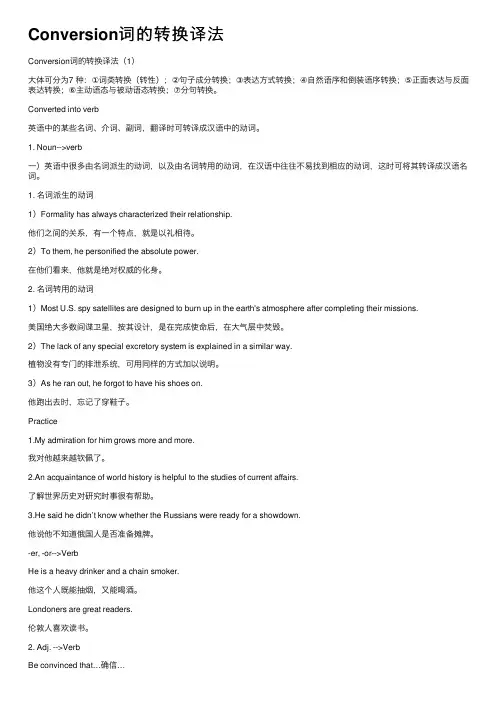
Conversion词的转换译法Conversion词的转换译法(1)⼤体可分为7 种:①词类转换(转性);②句⼦成分转换;③表达⽅式转换;④⾃然语序和倒装语序转换;⑤正⾯表达与反⾯表达转换;⑥主动语态与被动语态转换;⑦分句转换。
Converted into verb英语中的某些名词、介词、副词,翻译时可转译成汉语中的动词。
1. Noun-->verb⼀)英语中很多由名词派⽣的动词,以及由名词转⽤的动词,在汉语中往往不易找到相应的动词,这时可将其转译成汉语名词。
1. 名词派⽣的动词1)Formality has always characterized their relationship.他们之间的关系,有⼀个特点,就是以礼相待。
2)To them, he personified the absolute power.在他们看来,他就是绝对权威的化⾝。
2. 名词转⽤的动词1)Most U.S. spy satellites are designed to burn up in the earth's atmosphere after completing their missions.美国绝⼤多数间谍卫星,按其设计,是在完成使命后,在⼤⽓层中焚毁。
2)The lack of any special excretory system is explained in a similar way.植物没有专门的排泄系统,可⽤同样的⽅式加以说明。
3)As he ran out, he forgot to have his shoes on.他跑出去时,忘记了穿鞋⼦。
Practice1.My admiration for him grows more and more.我对他越来越钦佩了。
2.An acquaintance of world history is helpful to the studies of current affairs.了解世界历史对研究时事很有帮助。
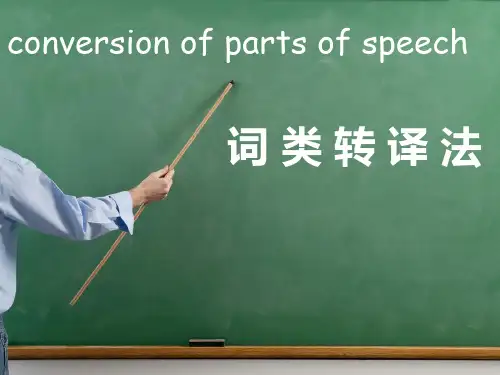
翻译技巧4词类转译法英语与汉语的一个显著差异:英语呈静态;汉语呈动态从词汇用法上,英语中常用抽象名词、动词的同源名词、同源形容词、副词及介词等来表达动态含义。
而汉语的动词由于无形态变化,若要表示动作意义,往往只能采用动词。
Don’t believe him.You should know he is a good kidder.不要相信他。
你应该知道他很会骗人的。
I’m doubtful whether he is still alive.我怀疑他是否还活着。
Mother is on the telephone with father.母亲与父亲在通话。
一、词类的转译(一)英语名词的转译1.英语名词—〉汉语动词nominalization)成为英语使用中的普遍现象,构成了静态为主的语言特征。
而汉名词化(nominalization语是逻辑性语言,不受动词形态变化的约束,使用较多的动词,形成了明显的动态优势。
英译汉的过程就是在译文中强化原文动态色彩的过程,常常需要英语名词转换成汉语动词。
(1)具有动作意义的名词(action nouns)例1.I’m convinced that China’s WTO membership will do more contributions to the development of global economy.我坚信中国加入WTO将会对全球经济发展做出更大贡献。
例2.Parents’love of children is perfect and minute.(n.+of)父母爱子女无微不至。
English.(n.+of短语)例3.There is no shortcut to the mastery of English掌握英语无捷径。
(2)有些与感官动词(see,hear,think,know等)相联系的名词(sight,sound,glance,view, knowledge等)通常转译成动词。
汉英翻译技巧之词类转换法Conversion▪Conversion: Conversion is also a common practice in Chinese-English translation. It is to change the part of speech into another.▪Verbs to be converted into Nouns.▪1) 林则徐认为,要成功地制止鸦片买卖,就得首先把鸦片销毁。
▪Lin Zexu believed that a successful of the trade in opium should be preceded by a of the drug itself.▪2) 邓小平在“十一大”上说:“一定要少说空话,多做工作”。
▪Deng Xiaoping said at the 11th Party Congress,“There must be and .” (v.--n.)▪3) 绝对不许违反这个原则。
▪No of this principle can be tolerated. (v.—n.)▪4)采用这种新装置可以大大降低废品率。
▪The of this new device will greatly cut down/reduce the percentage of defective products.▪5) 他在讲话中特别强调提高产品质量。
▪He raising the quality of products in his speech.▪6) 中国人民百年以来不屈不挠、再接再厉地英勇斗争,使得帝国主义至今不能灭亡中国,也永远不能灭亡中国。
▪Thanks to the Chinese people’s unrelenting and heroic during the last hundred years, imperialism has not been able to conquer/subjugate/disintegrate China, nor will it ever be able to do so.▪7) 他们一不会做工,二不会种地,三不会打仗。
中高级口译翻译技巧:转译ConversionConversion英语属印欧语系,汉语属藏族语系。
英汉两种语言在词汇和语法结构方面有许多不同,在大多数情况下英译汉时很难将两种语言的词汇和结构一一对应。
为了使译文符合汉语习惯,翻译时不必拘泥于原文表层结构,可以在忠实原文意义的前提下将原文中某些词的词类成分转换为汉语的其他词类或成分。
(1)N. - V.1)由动词派生的名词2)具有动作意味的名词3)以-er结尾的名词1. The employers called for the establishment of more vocational schools.雇主呼吁建立更多的职校。
vocation: (自己非常热爱的)职业【与Job的区别】Teaching isn’t just a job, it’s a vocation. 教书并不单单是一份工作,它是一种职业。
has a vocation for 有从事某种行业的天赋He has a vocation for teaching. 他有教书的天赋。
vocational schools 职校?technical schools 技校2.The sight and sound of our jet planes make me feel excited.看到我们的喷气式飞机,听到隆隆的轰鸣声,让我兴奋不已。
glance/at the mention of /3.He is a good speaker. His eloquence makes a name for him.他能言善变,他的口才造就了他的名声。
teacher/flyer/trouble-maker/eloquence: 口才 adj. eloquent 雄辩的make a name for 早就名声 make a name for yourself/make your nameExercises I:1. Don’t give me the runaround. Just tell me if you would marry me or notrunaround n. 搪塞,回避give sb the runaround (当别人要你做某事时)搪塞,顾左右而言他不要搪塞我,告诉我你到底愿不愿意嫁给我。
汉英翻译技巧之词类转换法ConversionConversion: Conversion is also a common practice in Chinese-English translation. It is to change the part of speech into another.1. Verbs to be converted into Nouns.1) 林则徐认为,要成功地制止鸦片买卖,就得首先把鸦片销毁。
Lin Zexu believed that a successful of the trade in opium should be preceded by a of the drug itself.2) 邓小平在“十一大”上说:“一定要少说空话,多做工作”。
Deng Xiaoping said at the 11th Party Congress,“There must be and .” (v.--n.)3) 绝对不许违反这个原则。
No of this principle can be tolerated. (v.—n.)4)采用这种新装置可以大大降低废品率。
The of this new device will greatly cut down/reduce the percentage of defective products.5) 他在讲话中特别强调提高产品质量。
He raising the quality of products in his speech.6) 中国人民百年以来不屈不挠、再接再厉地英勇斗争,使得帝国主义至今不能灭亡中国,也永远不能灭亡中国。
Thanks to the Chinese people’s unrelenting and heroic during the last hundred years, imperialism has not been able to conquer/subjugate/disintegrate China, nor will it ever be able to do so.7) 他们一不会做工,二不会种地,三不会打仗。
They don’t even know a thing about , nor about , nor about .8) 反对三峡工程的人说新形成的水库会淹没许多城镇和乡村。
to the Three Gorges Dam argued that the new reservoir(['rezəvwɑ:]) would flood many cities and villages.9) 了解过去有助于了解现在,了解现在有助于预知未来。
of the past is helpful to the of the present, which is in turn helpful to the of the future.10) 工人们坚持取消旧的规定,建立新的规章制度。
The workers insisted on the of old rules and the of new regulations.11) 坚持一个中国的原则,是实现和平统一的基础和前提。
the principle of One China is the basis and premise for peaceful reunification. (unify--reunify)12) 他们的儿子令他们失望。
Their son has been a to them.13) 这本书一问世立即受到人们,特别是大学生的青睐,并多次再版。
无须解释人们为什么这么喜爱这本书,因为只要稍加浏览,就可以看到书里反映了文明社会中对于友谊的看法。
This book enjoyed an immediate acceptance/popularity when published, especially among college students, and was reprinted many times. Its needs no , for a through it shows that it reflects the notions of civilized friendship.2. Verbs to be converted into Adjectives1) 获息贵国遭受海啸,我们极为关切。
We are deeply at the news that your country has been struck by a tsunami([su'nɑ:mi]).2) 他们怀疑他是否能负担得起。
They are whether he can afford it. (doubt/suspect+从句)3) 他们不满足于现有的成就。
▪They are not with their present achievements.4) 我们相信,在两市的共同努力下,我们两市的合作必定进一步发展。
We are that with the joint efforts of our two cities, the friendly cooperation between us will be strengthened.5) 并不是所有人都喜欢这个计划。
This program was not with all of the people.6) 有人建议降低政府开支,提高教师工资。
Someone suggested government spending and salary for teachers.7) 只有加强与世界的联系,中国才能继续执行她的对外开放政策。
China’s policy of opening to the world can only be continued by its ties with the world.8) 他热爱科学研究,但对升职不感兴趣。
He is scientific research, but to promotion.9) 那个孩子半张着口坐在前排。
That child sat in the front row with his mouth .10) 你熟悉这种晶体管放大器的性能吗?Are you with the performance of this type of transistor amplifier?3. V. -- prep. (phrases)1) 政府支持这个项目。
The government is this project.2) 我们全体赞成他的建议。
We are all his suggestion.3) 这种人闹什么东西呢?闹名誉,闹地位,闹出风头。
What are these people ? They are fame and position and want to be in the limelight/spotlight.4) 政府正在开展一场反对铺张浪费的运动。
The government is waging a campaign waste and extravagance.5) 孩子们都上同一个学堂。
The children are the same school.6) 我们对待世界大战这个问题的态度是:第一,反对;第二,不怕。
Our attitude towards the World War is: first, we are it; second, we are not afraid of it.7) 他们不顾一切困难、挫折,坚持战斗。
They kept on fighting all difficulties and setbacks.4. adj./adv. --n.1) 这个问题至关重要。
This issue is of paramount/vital/pivotal .2) 他试图以热情的款待把他的窘态遮盖过去。
He tried to cover up his embarrassment with the of his hospitality.3) 街中的一切逐渐消逝在灰暗的暮色里。
Everything in the street was gradually disappearing/vanishing into a pall of .5. nouns (印象、态度、特点、地位etc.) into verbs.1) 他的演讲留给听众的印象很深。
His speech the audience deeply.2) 该厂产品的主要特点是工艺精湛、经久耐用。
The products of this factory are chiefly by their fine workmanship and durability.3) 社会主义革命的目的是为了解放生产力。
Socialist revolution liberating/emancipating productivity/productive forces.4) 水银的重量约为水重量的13倍。
Mercury about thirteen times as much as water.6. Others▪我们的教育方针,应该使受教育者在德育、智育、体育几方面都得到发展,成为有社会主义觉悟、有文化的劳动者。
Our educational policy must enable everyone who receives an education to develop , , and become a worker with both socialist consciousness and literacy. (n. – adv.)Passage Translation女人发号施令的手段很高明,用的都是口气柔和的祈使句。
但不管怎样,事无巨细都要男人效劳总是不应该的。
The woman was very good at commanding: her orders were all couched in soft-toned imperative sentences. However, it simply wasn’t right for her to ask her husband to do everything.于是我猜测:他的妻子很漂亮,因为大凡漂亮的女人都颇有些自命不凡,总把自己当作个高贵的公主。
Therefore I came to the conclusion/guessed that his wife must be a great beauty, for beautiful women without exception are stuck-up/arrogant, imaging themselves to be noble/lordly princesses.。